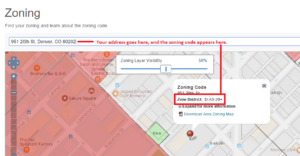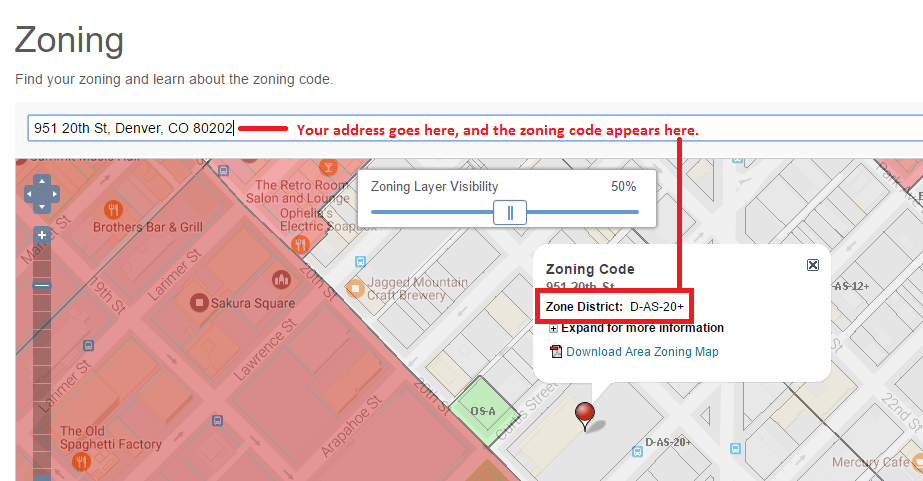Zoning Permits are Required for Denver Home Based Businesses
The city of Denver is working to make starting your small business as simple and affordable as possible. In recent years, laws which allow for fresh produce and cottage food sales from home have been passed in order to help small, home-based food production businesses get started. Through the Small Business Development Center (SBDC) in Denver and throughout Colorado, funds are often provided to help budding entrepreneurs learn more about the topics they need to master to succeed. All-in-all, Colorado is friendly to small business start ups and home business hopefuls, but zoning permits are required for Denver home based businesses.
Will Your Denver Home Based Business Need a Zoning Permit?
Most people think of zoning permits as being connected to retail sales, or start-ups that are associated with a licensed profession. Not so; even if your Denver home office is just a place where you connect to the internet to do freelance work, you will need a home occupation permit. You will also want to know if it is legal for you to conduct the type of business you plan to run, from your home. Be warned; the process for figuring out if you can run a specific type of business from your address is not simple. Why? Because there are multiple elements you need to examine:
The first element of your zone district represents the neighborhood context, the second part represents the dominant building form and character, and the third part represents the minimum zone lot size or maximum building height. Occasionally there is an additional number or letter as the fourth part, which represents a special purpose.
It may help to see an example. Let’s say you’ve plugged in your address, and found your zone district using Denver’s online zoning locator map.
The image below shows an example of a zone district (click to enlarge).

Zone districts are coded. Below is an example of a Zone District code – let’s break it down and see how the code translates into whether our not you need a Zoning Permit to operate a home businesses at this address:
S-MX-F3
The initial element, in our example, “S” will describe the context of your neighborhood. Is it suburban? Downtown? The zoning rules will of course be different for a suburban neighborhood than an urban edge neighborhood. In our example, “S” stands for a Suburban neighborhood context. You can see the zoning code associated with each type of neighborhood on the Community Planning and Development page (on the right hand side) of the Denver city government website.
Context is actually a really interesting element that attempts to label what you and your neighbors expect to find in your neighborhood so you don’t wake up one morning with an auto mechanic’s shop next door to your Victorian (although, if you’re trying to preserve a Victorian that’s in a mixed use neighborhood, you may anyway!). The city of Denver provides a video to explain what goes into determining context.
We’ve got the first element covered! Our sample code is S-MX-F3. So what does the MX stand for? That describes the dominant building form and character. Your address could be designated as a Mixed Use area (MX), or a Residential Office (RO) area and so forth.
Some buildings are designated with a special provision (A= Special provisions). It is unlikely that your home address will return a special provision element, but if it does, you will need to make a phone call and ask for details. The more typical codes for Dominant Building Form and Character are:
SU = Single Unit
TU = Two Unit
TH = Town House
RH = Row House
MU = Multi Unit
RO = Residential Office
RX = Residential Mixed Use
CC = Commercial Corridor
MX = Mixed Use
MS = Main Street
We are in the home stretch! The final element will usually describe the minimum lot size and maximum building height designated for your lot. This element is important if you are planning to build your new home office above your garage, but not so much if you are planning to start your business in the spare bedroom. Zoning rules are why your ranch style house in the suburbs doesn’t have a skyscraper on either side of it: lot sizes in the suburbs as well as the height of the buildings allowed are controlled by zoning laws. In our example, the final element – F3 – tells us the minimum square footage lot size, and building height maximum per the chart below:
Square footage:
A = 3,000
B = 4,500
C = 5,500
D =6,000
E = 7,000
F = 8,500
G = 9,000
H = 10,000
I = 12,000
Height:
2 = 2 stories
2.5 = 2.5 stories
3 = 3 stories
5 = 5 stories
8 = 8 stories
12 = 12 stories
16 = 16 stories
20 = 20 stories
So, the lot size for this address is 8500 square feet, and the maximum number of stories allowed is 3. Now you know! But how does this impact your need for a zoning permit? Remember when we said it was easy, but not simple. Here is where it gets a little less simple: you need to find out what types of businesses are allowed at your address in what is called the Context Article. There is a context article for each neighborhood type, so if you are in a suburban neighborhood, you will open Article 3: Suburban Neighborhood Context and find out if the type of business you plan to run in your neighborhood is allowed. This set of rules is what prevents a night club from opening up next door to an elementary school. Once you know the type of home business you plan to conduct, you open up the Article for your Neighborhood Context, and find out if what you want to do is allowed in your neighborhood. Here is what the article will tell you, once you find your home-based business idea on the list of business types:
*= Need Not be Enclosed
P = Permitted Use without Limitations
L = Permitted Use with Limitations
NP = Not Permitted Use
ZP = Zoning Permit Review
ZPIN = Subject to Zoning Permit Review with Informational Notice
ZPSE = Subject to Zoning Permit with Special Exception Review
When no ZP, ZPIN, ZPSE listed = No Zoning Permit required
What you hope to see is “no ZP, ZPIN, ZPSE listed” because then you don’t need a permit! What you don’t want to see is NP – because then the type of business you want to run from home in your neighborhood is not allowed. You can find the Article for your specific neighborhood context (this was the S, or first element of our zoning code example) in the Zoning section of the city website, under the tab labeled “View Denver Zoning Code by Article.”
Remember, if you can legally operate a specific type of business from your home, you will still need a zoning permit for home occupations:
A zoning permit is required for all home occupations.
You can complete your zoning permit on the city website and (thank goodness!) it’s pretty easy to do. If you need help determining which zoning permits are required for your Denver home based businesses, or have any questions about the legalities of running a business from home, contact me, Elizabeth Lewis, at the Law Office of E.C. Lewis, P.C., home of your Denver Business Lawyer. Phone: 720-258-6647. Email: elizabeth.lewis@eclewis.com
Contact Us Today
Law Office of E.C. Lewis, P.C.
Your Denver Business Attorney
LICENSED IN COLORADO AND NORTH CAROLINA
Mailing Address:
501 S. Cherry Street, Suite 1100
Denver, CO 80246
720-258-6647
Elizabeth.Lewis@eclewis.com
Online at:
Real Estate Services for Business Owners
Elizabeth Lewis provides the following real estate law services to small and medium sized business owners in Denver and throughout Colorado:
- Commercial real estate purchases
- Legal review of commercial real estate leases
- Protecting your assets


